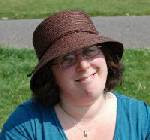Recently I attended two separate evenings of theatrical performances of poetry. Both were extremely well acted and produced, and both were based on very dramatic and well-written poetry. This has led me to thinking about the link between performance and poetry, the distinctions and differences, and the, what to me now seem rather obvious, similarities.
The first performance I attended was local poet Bernadette Cremin's 'Altered Egos'; a series of six monologues by six different characters created through Bernadette's very narrative and identity-driven poetry. Each character was very distinct, and brought vividly to life by Bernadette's powerful and evocative words, wigs, a few props, and her talented acting. The poems included new pieces as well as older poems that I personally had heard and read before. And Bernadette is very much a performance poet. Although her poems stand up on the page, there is always something more about hearing them read, especially by Bernadette as she draws the audience in with her emotions, stories and words, her focus (interacting with her audience by not reading off the page), her amazing outfits and her often bare feet. She always tells a story, and her characters are always real and colourful. However, there is a big leap between even this kind of performed reading, and a performance based on poems. And Bernadette made that leap with style and grace. The end result was an enjoyable, interesting and thought-provoking evening.
A week later I was lucky enough to be in the audience for a dramatic recreation of 'The World's Wife' by Carol Ann Duffy, produced and performed by the Galway-based Mephisto Theatre Company. Again these were words I was familiar with on the page; again the poems are character and identity-driven. And, like Bernadette's brave performance, the three talented members of Mephisto easily bridged the gap between theatre and poetry. The poems were performed using a small number of props and various costumes, while the actors became the wives of famous men and bought the audience into their lives and their stories. And yet they also allowed the poetry to shine through, the words to sink in and linger; their visual representations of them only added to the poignancy, enabling us to truly hear these women.
Today, theatre and poetry is often seen as separate. Poets still write for the page, and often read from the page when sharing their work. Theatre is more 'common', more for the masses, it seems. But of course Shakespeare is just as famous for his poetry as for his drama, and his plays are poetic in themselves. Poetry is about rhythm and rhyme, needs to be read aloud and heard as well as structured. Too often today poetry seems to be about the words and structure, and less about the rhythm and rhyme, the capturing of a thought or a moment or an observation. It's more about being clever with words than about being real. Theatre, of course, is fiction, is exaggerated and dramatic. But it is emotion and interaction with the audience, as well as story. Surely this is what poetry should be as well? And there is nothing to say that poetry can't be fiction. The 'I' of the poem may not be the poet, just the narrator, but it is likely to also say something about the poet and his or her views on the world. Maybe poetry is drama without the drama? Something pared down and made 'real', for whatever value of 'real' you can assign it. Especially as poetry is rather marginalised within today's society; bringing it to theatre audiences can open it up, de-mystify it, and allow it to actually be heard. Actors can portray the drama, emotion and sounds in poetry, and bring it to a new and different audience, while poets are able to bring meaning, emotion and metaphor to the theatre.
Ecosexual performance night at In a Land
1 day ago



